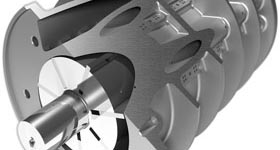Solving the fixed speed vs variable speed conundrum
Do you know your demand for industrial air? And how meeting it in the right way can make your business more profitable?
“Over a five-year period, and including capital expenditure, about 75% of the total cost of owning air compressors goes on the electricity to run them,” says Mattei general manager Andy Jones. “So when buying new machines, energy efficiency needs to be your top consideration.”
Variable-speed value
Many see variable-speed drive compressors as the most efficient. These machines:- Adjust air supply according to demand, unlike fixed-speed compressors which deliver a constant air supply
- Precisely match power consumption to required load profiles
- Reduce your electricity costs – Mattei’s OPTIMA series machines, for example, typically produce energy savings of 30% or more versus fixed-speed compressors
Know your applications
“However, variable-speed compressors will only reduce your energy costs if there are peaks and troughs in your demand for industrial air, so aren’t suitable for all applications,” explains Andy Jones. “You need to understand your air requirements to know if a variable or fixed-speed compressor is right for your business.”
Data logging reveals all
Before you invest in new compressors, Mattei recommends a preliminary data logging exercise which:- Measures your plant’s air-consumption profile over a seven-day period
- Evaluates your compressed-air needs and your system’s efficiency
- Includes discussions to identify any unusual patterns or planned process changes
Data logging only gives a snapshot of your compressed-air activity. But it can include allowances for higher or lower demands than usual, and is widely considered the best way to check if your plant’s air demand fluctuates or is constant.
Is one of these scenarios yours?
Once you know your air demand, you can make more informed decisions. Two typical scenarios revealed by data logging are:
- Factory A has variable shift patterns resulting in variable demand for compressed air. In this case, even if the compressor needs to run 24/7, a conventional fixed-speed machine isn’t the most energy efficient as it will constantly operate at full power to meet the (only occasional) peak demand, wasting expensive energy.
- Factory B has constant shift patterns, and relies on constant compressed-air flows around the clock. Here, fixed-speed machines – versus variable-speed compressors – are usually the most energy-efficient option.
Predicting future currents
“If a company wants compressors for a completely new process,” says Andy Jones, “data logging is not an option. Instead, we’d analyse and discuss potential air demands to decide if a variable or fixed-speed machine is the best compressor for that customer’s application.”
Mattei compressors – the best of both worlds
Mattei understands there’s a need for, and continues to invest in, both types of technology. Your options include:
OPTIMA series variable-speed compressors
- Off-load consumption below 10%
- Power outputs from 11kW to 200kW
- Capacity ranges from 1.19m³/min to 35.5m³/min (42cfm-1,255cfm)
MAXIMA series fixed-speed compressors
- Designed to operate more than 4,000 hours per year
- Using as little as 5.4kW of electricity to produce a cubic metre of air, making MAXIMA the market’s most energy-efficient compressor of its type
- Power outputs from 30kW to 160kW
- Capacity range from 6.45m³/min to 31.8m³/min (228cfm-1,124cfm)
Maybe your business has a constant base load, plus additional variable demand? In this case a combination of OPTIMA and MAXIMA compressors can deliver savings versus any other system.
Spotlight on savings
Industry is looking to reduce its energy consumption and costs, and to lessen its impact on the environment. So air compressors are coming under close scrutiny and leading manufacturers like Mattei are developing new energy-saving machines.
We’ve all got a part to play
“Variable-speed drive compressors have become a key part of the solution,” says Andy Jones. “But as manufacturers and buyers it’s up to all of us to ensure we only specify and use these machines for applications where they can actually realise their potential efficiencies.”
Contact us for more info>
Back to news
